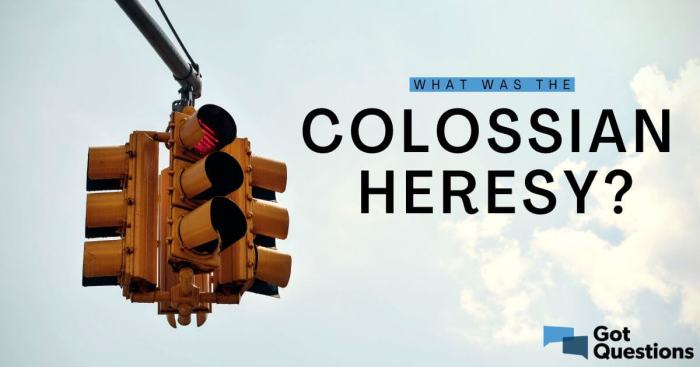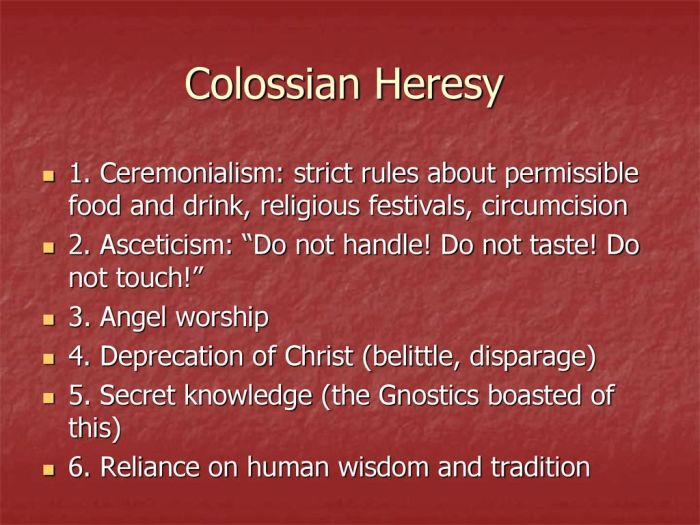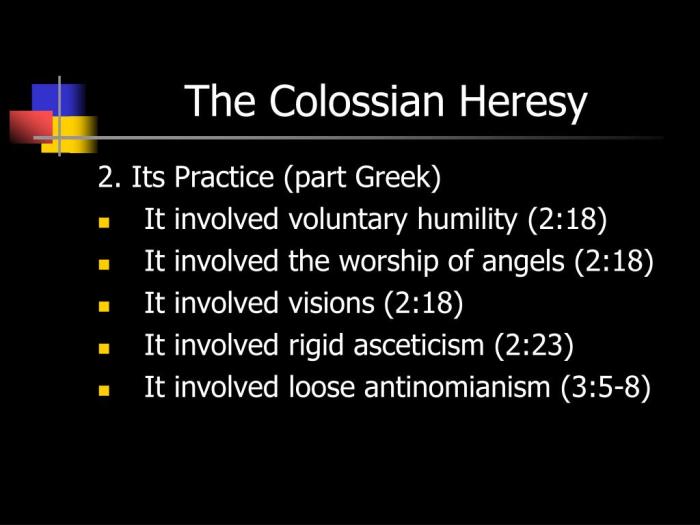The colossian heresy emphasized what – The Colossian heresy, a deviation from orthodox Christian beliefs, emphasized the worship of angels and denied the divinity of Christ. This essay delves into the origins, key tenets, and implications of this heresy, providing a comprehensive understanding of its impact on early Christianity.
The Colossian heresy emerged in the first century CE within the church in Colossae, a city in Asia Minor. Its adherents, influenced by Gnostic and Jewish mystical beliefs, embraced a unique set of doctrines that challenged the core teachings of Christianity.
The Colossian Heresy

The Colossian heresy emerged as a significant challenge to the early Christian church. It threatened the foundational beliefs of Christianity and gained a considerable following before being refuted by the Apostle Paul and other early Christian leaders.
Origins and History
The Colossian heresy originated in the city of Colossae, located in what is now Turkey. It arose in the first century AD, during a period of rapid expansion and growth for the Christian church. The exact origins of the heresy are unclear, but it is believed to have been influenced by various philosophical and religious ideas prevalent at the time.
Key Beliefs and Practices
The Colossian heresy espoused a set of beliefs and practices that differed significantly from orthodox Christian teachings. Central to the heresy was the emphasis on angel worship, the denial of Christ’s divinity, and an adherence to asceticism and legalism.
- Angel Worship:The Colossian heretics believed in the worship of angels, considering them as intermediaries between God and humanity. This practice was a deviation from the Christian belief in the exclusive worship of God.
- Denial of Christ’s Divinity:The heresy denied the divine nature of Jesus Christ, instead viewing him as a created being. This belief contradicted the fundamental Christian doctrine of the Trinity and the divinity of Christ.
- Asceticism and Legalism:The Colossian heretics emphasized extreme asceticism, including strict dietary restrictions, celibacy, and self-denial. They also adhered to a rigorous legalism, emphasizing the importance of observing Jewish laws and rituals.
Spread and Followers
The Colossian heresy spread rapidly throughout the Roman Empire, gaining followers from diverse backgrounds. It appealed to those seeking spiritual guidance and salvation, particularly those who were disillusioned with traditional religious practices.
The heresy was particularly influential in the regions of Phrygia, Colossae, and Laodicea. Its followers included both Jewish and Gentile converts to Christianity.
Contrast with Pauline Theology, The colossian heresy emphasized what
The Apostle Paul played a pivotal role in refuting the Colossian heresy. In his Epistle to the Colossians, Paul clearly Artikels the orthodox Christian beliefs and confronts the heretical teachings.
- Emphasis on Christ’s Supremacy:Paul emphasizes the supremacy of Jesus Christ, affirming his divine nature and role as the creator and redeemer of all things.
- Rejection of Angel Worship:Paul strongly condemns the worship of angels, stating that it is a form of idolatry and a departure from the true worship of God.
- Critique of Asceticism and Legalism:Paul argues against the extreme asceticism and legalism practiced by the Colossian heretics, emphasizing the importance of faith and grace in the Christian life.
Implications and Impact
The Colossian heresy posed a serious threat to the unity and purity of the early Christian church. Its denial of Christ’s divinity and its emphasis on angel worship and legalism undermined the foundational beliefs of Christianity.
The heresy also had a negative impact on the lives of its followers, leading to excessive self-denial and a distorted view of the Christian faith.
The refutation of the Colossian heresy by Paul and other early Christian leaders was crucial in preserving the integrity of Christian doctrine and ensuring the continued growth and spread of the Christian church.
General Inquiries: The Colossian Heresy Emphasized What
What were the origins of the Colossian heresy?
The Colossian heresy emerged in the first century CE within the church in Colossae, influenced by Gnostic and Jewish mystical beliefs.
How did the Colossian heresy differ from orthodox Christian beliefs?
The Colossian heresy emphasized angel worship and denied the divinity of Christ, deviating from the orthodox Christian belief in the Trinity and the divine nature of Jesus.
What were the implications of the Colossian heresy?
The Colossian heresy challenged the core doctrines of Christianity, raising questions about the nature of Christ and the role of angels in salvation.


